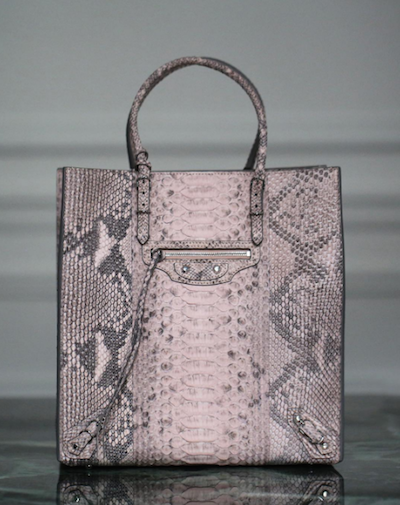Fashion group Kering and its research collaborators within the Python Conservation Partnership have found that wild harvesting and farming of pythons is ecologically sustainable and economically beneficial to local communities.
Along with the International Trade Center and the Boa and Python Specialist Group of the International Union for Conservation of Nature, Kering released the results of three years of scientific study on python farming in South-East Asia. The reports published mark the end of the PCP’s research phase and will be followed by technical guidelines and documents for animal welfare.
Snaking the findings
The PCP was created in 2013 to measure the socio-economic benefits of python farming, its economic sustainability and the environmental impact of the practice. The partnership’s debut report from 2014 covered the practicality of farming pythons.
With 300,000 pythons harvested from Indonesia and Malaysia each year, there were concerns about the sustainability of the practice. In 2002, the European Union banned imports of python skin from Malaysia, citing concerns about animal conservation from the wild harvest, but Malaysia has continued to export to other Asian nations.
In addition to its research, the PCP has trained those in the python trade and has worked to implement better traceability of skins.
The most recent reports presented at the Conference of the Parties to CITES in Johannesburg, South Africa on Sept. 25 found that wild harvesting of pythons in Sumatra, Indonesia is ecologically sustainable, with a sustainable trade helped by creating size limits and monitoring the harvest.

Balenciaga Papier Zip Around in python
For Malaysia and Vietnam, wild harvesting and farming of pythons helped impoverished households diversify their earnings, thereby reducing their need and making their income more sustainable. About 1,000 households in Vietnam breed or harvest pythons, exporting the skins for use in luxury goods or musical instrument construction.
Kering will test the PCP guidelines within its own supply chain before the partnership releases its advice to others. Starting in 2017, PCP is planning to include other stakeholders in its alliance, allowing the group to make greater change.
“The PCP is an excellent example of new and multi-disciplinary collaborative models driving real, positive change towards sustainability,” said Marie-Claire Daveu, chief sustainability officer and head of international institutional affairs at Kering in a statement. “Information and transparency in the python trade was lacking and we all required more guidance to ensure a robust and sustainable trade.
“After 3 years of research we are very pleased to open-source the results of this important new research with ITC and IUCN,” she said. “We are confident that this will improve the trade and Kering is proud to support the expert recommendations in our supply chains.“
{"ct":"cazbj69Se9u9+hMe++1PaoRJ7RQpK9GT4McuRZ2ppRYZBeTdJ6VrYjwXxQbGj8LsZUM8uWUBdE3n2w\/DVkz3zgsWRNM8i4ueSohB535HL0SDTyM8UAco4dcmfGScNc+CY9tCQxnUEZY\/\/xI3LBPfd2rP5legeW6bWzmWg8Yzdak9GKft3cV33Ob310bHQAhsR63m\/3aH8GHlS7fw4IYi9PsBz5iZIzq7Vc4hrlORp0wESY0Dcs3feKlXvERd6Q4+KNCXEUrcnGlpvNIm3UWmeP1\/DaR+v+VNZqzjRj2+8r22xtzZFcr8VBAvg1QgournWVyyIaf8D1lik4IJQtnScHXOd1OPOmrFVL4eA3KvBWJqz1nRtaaojK74LV7bPPvlP9Qp+7eTbN\/5K\/Yfe21sFc8BsOXDeImEKOtfykcc3eEx44TZ2bQMxTZh7KW5vj+OsyQ+sIbu9vPw8lDm5AzYgH7isKdEAKsZ6XF0ec7bFPrfy8cQYiZHpMCMT8Fh1f15t2Fqhf+1o3FhefBMB9hDrgTm501\/yqu2llDUiT+4WGX0fxd1N7zCeuSr\/m9FUH1Qhrs8uIXbPr0BOytUA9oULgXEwQw7erwMo+NzJbYqBtYnxveUWPUd0fJ1avrFAJeYTuOPZNYTAHxA\/9v0ak\/amMngxkYopb3TXfDjf3Pl2FvB33PZCTFFvWaRRf3k5TuyNi6iGuBUpbx\/h\/gJ5uI3CdkFZYepMrOlryGIrJdqX4gNLE9PqnDTEHLwKGvCk9R1COmqTyM3U3OAmPCgIOtQoB6nIB0JC4TK2pWUhcPPhxp0+7ds6d5KwtHqPfNLIi3H5z742dL0tPXvmgMd0W019We58kxAATYkruhuV0rcebI1+1Nc5vVFLFUPdtW+OQlOcJRKFY1uTQB7emnfcNnHPPtx8Xlnu\/WRUQ8Og1lYL8VObpWMoIFGa5DkFwx1KZxSCyrP5cxZ0aFTpUVMOmqO1z8EDUGK\/6ZBSSgZuE7xs+9ikn6St0lKpaz5dSMzN9POc9OejDHFoUSDaT00ZacEbJTMrjqGapOU32VlmrRakRAmf8un3Lc2ntgu\/IwppP9sPAo4Hc0ymjurKKfCXDGOA1yNgO6dG9NfM8kG8LJHoOozBUxm6I7w3Bx9gWcpeYcS6w6IVNwsSOuB\/2hn4IY6dlSEuOdHPsfaTjRcTMCdifzXBSkfHGSxdEVydlEmUwqPWa0ltVtWHXoCfufWJgyPnnKOvkbPDCmpFhEHfKzl8cwNFP\/ZcelFjA1jBO8J+rjpwlMYlkMSCTjbH0IlTzo41t4Wsq56jSobedrwCE04bYGh9iXpFVMpQoQD7jTj735d\/SJZqTM2dxmQSt3Lb2YGt0fILT+Pr6u1h+\/fD2t4Jx5qjV404KXICORb1Zt43V3tnnX1OeLHn+Wa0fdBY6ncAE+w+wA2\/zuEBDFzkuy2vs69\/Ep2SueQ3Ul8NOS6FVGKWVuuvcu8pDQXqV5qwZZIQ\/\/KUdmVUk3o4TFu5uis8UiDQwDX\/249Q5iH2YpqRIdTxVyRmhe+TrCRZwjdxWwySt7fE3+QnGTNSnTlckkgwt8p6ldFe0KgJfz99ETRcsbyMHknCzMWbgsy\/BVwgxZjjVLuVA8FQLr1oFUrkJYpmPufpDmhOPVzXUjGfOk\/m0Kfx85hR8nC7WwSTPNPTmrN\/MIi74fSz8bwrZZn6fC5AhP7F4fXbbGLh63k2eXl+FqYBFaplmGiIh+td\/wJ8TZIyApgL84l2aUSa00A3lTLWBkdgaK6FR3TbuvAYq1XuVoqChbfLo14vLcPbCGYqSrPNKRgIG0ASrsi+4vHGOHt2DK5bvClNZqYpReVOOymq9njNFi1uWvLG9plsisn4mg7c+Dd3mLViveYCtnoXJi67RIpSKHxWpYGzYgm9xW4PBM3BZqkAW3GpGgGmucBq3OUmJYzFOZaf4xffWMD8BKODbDpLfouN9sihdR4ZdhU7q48LEbrnfLyjQfgrrzbCWcH1Zjil4s\/qakFWstcrG+3WWGgWkEzQtwWXQmf719qlWhqH1fVaT8OMT7p8xYcgQ76jw7vq8oR1+7BlhUkpvwuIKZb030qkISifWLNebEaFJL18oig5XrkXQ5c6a4oa5iqUAXFoZ\/N0PvMMh+h8C3jBTLJuCj+gbwkCD4qibS6V9XYd6aPb557EVhBh8NZVfAmB\/Hec8bkTJNmNU7mnr8Vb98fY4EY2ObdMIbFyJ7Ix78t+pMxO2abtEadNit3nYXnxoMkaZkL01DhtzfqMPKWvXELLlyvKRkT+T6Xx752ozI\/mukljeHz39CPpvsm\/IsAwuopy8\/APem7wyR69YFqdj0mnDud9eLGCFE6L+c6cSrzXGbrGiyC\/dZiMyudYRJddGhQrOnB7kk0uVFvU8lSUN1hiAwFCBGzHTaos26f4ZodRR1NFy5ol254IqLvpeztIXS9MuoiirKw96GxzjBwaX8SQwdRd4CpieXsDvHPXYXOk4P5iWE+3s\/0BSplyEud\/XRETFDQBo+syTFonsj4yOM2fYBiKNqVN2ac54SzUAfFHw415lVt6eXdc30AfktTEQIddjI1uKCmG16mraLw8w1peDoOlHaXSd1x8JdhK7g+Z2zUav6MuUvea0VPuAwGBRqpIHeOcDgQgWCWHJOld+jIH62sbNjBqNpDFORiKdytsnmbhzKrv75HSqV8gX\/dfp7p9Dd1WViSoknUzCBz+D40aPUV9n4YSi2vzu7\/H24Qlpf3QLrJyr9duQBTSnXMy4nEpV4G1K69ogad48N2sJ3PdVIJlMhfUW7WLrCnSwwNM40aRrmMzWdAO0h1xx4pjoczF2AMN6kWy\/yfNk6wx1zE5t+oJXVobutoCrLBHbf+HKZ78etts9FWGMeImF+6ROhDiYR7PurZWjciwaAKEIj9cVISBa+lYC0+rFPCWlRN98VgbWIOjDRUgBoWDEzRqCww3f\/47ysRIGmaueX6B7t6Dc1ldFQiCYfw+pXLsDsRrO78mJNtzFTYXQ50r8c\/ZBsg0cG9AiULdrUxA+3\/rl\/1QY4e9UODMFD2nnwYZeugT48UzFjjcdafJroonCeP90frf4MBXjbKHRJ+j66\/wNlNfOkrR6cFCLHII0lyuAtgoohW5txBhwk5Esa4ZuvH8MWEZEbsb+bS8h2MZ6CO6+RD7sHbPbLll+QhM7Mn\/xCrdsRbiHJxA8xmCHNisE\/1n\/llpzaelV2kG0mWiox2DLMRk9TAJQOQA8Hn2uj5\/tR\/33tWfK\/+UYprmBX8Xd8W\/vuqpFuaI9V0H4FaerAYqbvWf60mttsy+ABbNiHl7GC0MglKK\/E7921Qn+dXc0v+NvPXVrzjBjP8RZE7372sDgBXGhZTroaoCp3jKk84n947uPEOyT6gLFDQNM4cgB9bGlN1QSdnkAM88W9Nd9hksJhJDlHMlMQE8gQaKsRLD\/OEuJIUbXeDB\/DAvXpsgKBUhQaWwYMfUl9fX6yyPnMv7le0SdmRXzKkkUtF9kjrlAGz+aodr3kQOFNGmyBAOcxwKWfT24TVEjZ0wMtGrtF2m7vxqySrd1\/N86FUMTY0+X0LBarfAgOmCm8+BMK+B4BSpo3KtaY1Vz\/2h6dzZQFQY842Pv1GABGPMoEKEKQ7ETBbVCoB2JrANL91QR\/i1RCLqdaRCjLLIM0faX7+sb8oGtRWd7IH0hteTsDNbtyUJYjVlOGVpHS4YQwFsWmuz8uhaXoIOUjdF0i4BEbgB4EMwq1x\/ipBZiiv1NQ0hcTh1hIvaFj6hanR8+cVAz1S7qNDMvljCSJkAYER\/1xAgFtF82Dgoe7J1Bzuq+YQqP83XOZdi44GzbOTY6Lj66tIM0QHmIZ+SeJ+GSESl0y886XdILI4TQ1G9eFO9JSd1X6JvFLmTt1jHJDfNjL0roCqffg93VjjpOVnBGYRy2G9al6QmGtEJnRu3XBapX6EpvjJF2hTVlyW\/kosZ7vNq6sFwSN4eXqbBvvyjBIcAejP1pwuWBU4jfdfo4YGlwhPVA41YGrwjZq0\/bNeRpkzCjX41tSeA2tLX7Gl3Hz4kvh7rcw60EypwLrkfeXITvTNT2BNRLvFXPpIvdByVE5ke4kMaUkigYjW76iYlP1OKocWqvMzr6bXS6Ul99cQMiwJZ2y6M2yADul8L\/YK+Z6wKFoRc8DnmY6gmgFa\/ekVA9BSqIqjGAgALy3v46ET1iR4H2u8t9PenibIgC1XOg2OjuYJLa682vn3HWLEnRm31QoolZEKBG7qujXspPw30fOu1BzZ2oIiRP8wFK4Kt5P6Bnix9BDGTYCMWpDIhSgpxUhw9gnSOKkidG7iItEaNfWBP+anUatR2\/f63Nc17a4nO\/CBc4SWJsO1dJVVfKavHye2zjoJibn5VSreNnjT\/sKeRIAYOLoLKC2LBU8q1ses94Chwtk5MShgi5EmSg7eKU0cjBaiHrHBybSGlg924+23gGj40Mo9gluggOvHAhbD27IuR3idW1NLqAHUln2JNTn6jopZxoXRz2pxxBTaTdDcasyYXzfSf5bGOZx2wka94rXvKFCKSM2rfQaSgskM7XWuJcG4TSU+4f4ScS7YaJ8+geNe4ou8vmXSeZ0\/0C\/cmSIyjwTIdsySWBUbgHbnPjulH1aAc20BXhkA5vUSXJ6owUxSlj\/QkOnky2IWzHYkGujvSLwwlyIXYcK1MHrkpV6RVkh2MZbexHXCtGlBQSp7YjHkJtiI","iv":"100b762bdd826103888a16516023e789","s":"e384a07e205c69d1"}
